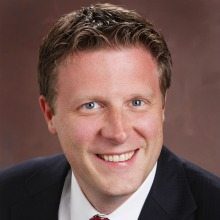
WashingtonExec recently interviewed Randall Porter the Assistant Vice President of AT&T ForHealth. Porter has an extensive background in healthcare industries and works toward providing professionals with the best technology that allows them to give patients the care and attention they need. Porter is excited about his work and recognizes that new technology is the number one solution to solving our country’s healthcare problems.
 Washington Exec: When most people think about AT&T as a company they don’t think about healthcare solutions. When someone asks you about your job how do you describe what you do?
Washington Exec: When most people think about AT&T as a company they don’t think about healthcare solutions. When someone asks you about your job how do you describe what you do?
Randall Porter: Healthcare IT is a major opportunity – AT&T generated approximately $4.9 billion in revenue from healthcare industry businesses such as hospitals, insurers, pharmaceutical companies, suppliers and physicians in 2010.
AT&T has sold technology and communications solutions into healthcare for decades and in 2010, created a new practice called AT&T ForHealth that will accelerate the delivery of innovative wireless, cloud-based and networking services and applications to help the healthcare industry improve patient care and reduce costs. Its focus is to deliver advanced IT solutions to healthcare industry businesses such as hospitals, insurers, pharmaceutical companies, suppliers and physicians.
We are creating the applications and platforms that drive mobility and integration, investing in global infrastructures and networks that connect endpoints of care delivery and creating new ways to exchange critical health information in a highly secure manner across the care continuum.
U.S. healthcare spending is expected to nearly double to $4.6 trillion in 2020, from $2.6 trillion in 2010.
Washington Exec: ObamaCare is a controversial topic in healthcare debates around this country. Does ObamaCare have any significant impact on the ways you do business with you clients?
Randall Porter: According to a recent report from the Centers for Medicare & Medicaid Services, U.S. healthcare spending is expected to nearly double to $4.6 trillion in 2020, from $2.6 trillion in 2010.
Several factors are driving the increasing costs – general population growth and people living longer, needing to help patients better self-manage chronic diseases, dwindling physician and care resources, inefficiencies in care delivery (e.g. duplicate or unnecessary tests) and a lack of good access to the right information in the system.
What’s clear is that the healthcare industry is at a tipping point for fundamental change. Technology will be a key enabler in driving this much needed transformation within our delivery system that will ultimately help improve patient care and lead to better healthcare outcomes.
Washington Exec: Government regulations have a big impact on the way patients get treated and how long it can take. When it comes to government regulations in healthcare how does AT&T make it easier for healthcare professionals to do the job?
Randall Porter: AT&T works to comply with federal, state, and local regulatory agencies that oversee the safe and efficient delivery of healthcare. Our portfolio is designed with flexible solutions serving all stakeholders, patients, providers, payers, etc., so it depends on each party’s particular need. Some tools are for clinicians alone, others for healthcare IT professionals, and others for patients. It looks different to each group, but ultimately it serves the same purpose: to expedite information exchange to improve patient outcomes and reduce costs.
Under AT&T ForHealth umbrella, we are developing and delivering advanced IT solutions in four areas: mHealth, telehealth, cloud-based healthcare solutions and healthcare information exchange (HIE). We are conducting several pilots of new technology with hospitals, doctors, health plans, institutions and agencies responsible for providing medical services and patient care.
What’s clear is that the healthcare industry is at a tipping point for fundamental change.
Our HIE offering, AT&T Healthcare Community Online permits providers within a healthcare system to easily exchange information and share applications in a highly secure manner. We created HCO to simplify the integration of information from multiple data sources, and different vendors and organizations. It is the foundation for a more efficient and integrated care process. HCO is also a forum for provider collaboration as it provides a single source view of patients’ consolidated health records and single sign-on access to applications and can enable physicians and clinicians to optimize workflow and meet government requirements for meaningful use.
FDA regulation is evolving regarding mHealth on requirements for applications and devices. The healthcare industry is an industry particularly well-suited to take advantage of wireless technologies as they can allow caregivers to have immediate, real-time information about a patient’s condition and response to treatment. Mobile technologies can be used to remotely monitor patients, potentially preventing unnecessary ER visits or hospitalizations. They also make it possible for patients to receive and send bidirectional personalized healthcare text and email messages and coaching in low-cost ways. Mobility can also enable physicians with smartphone applications to be more efficient and more effective as they make their patient rounds in hospitals.
Washington Exec: What’s your greatest achievement in your career?
Randall Porter: AT&T has given me the opportunity to work in many innovative areas like wireless and wireline integration, so it is hard to identify one thing. However, being an internal optimist and focused on the future, I’m excited about what AT&T ForHealth can do for the industry and for our nation. I know that one of my greatest achievements will be the expertise we’ve assembled on this team and throughout the company, the innovative solutions we’re bringing to market, and the impact that AT&T ForHealth will potentially have on how care is delivered in this country.
Washington Exec: What do you want to be remembered for?
Randall Porter: Personally, I evaluate this on multiple fronts. However, if we separate personal goals from professional goals, I would like to be remembered for my passion around collaboration and relationships and my focus on using technology to improve outcomes; whether in business or healthcare. Healthcare just so happens to be a great example. You’ve got multiple constituents throughout the ecosystem who are ultimately concerned with improving the quality of care in the U.S., while at the same time driving down costs. No one company or person can do it alone. Technology is a critical piece, however, you can’t maximize the value of the technology unless the right relationships are formed to collaboratively assess and address the critical issues.

